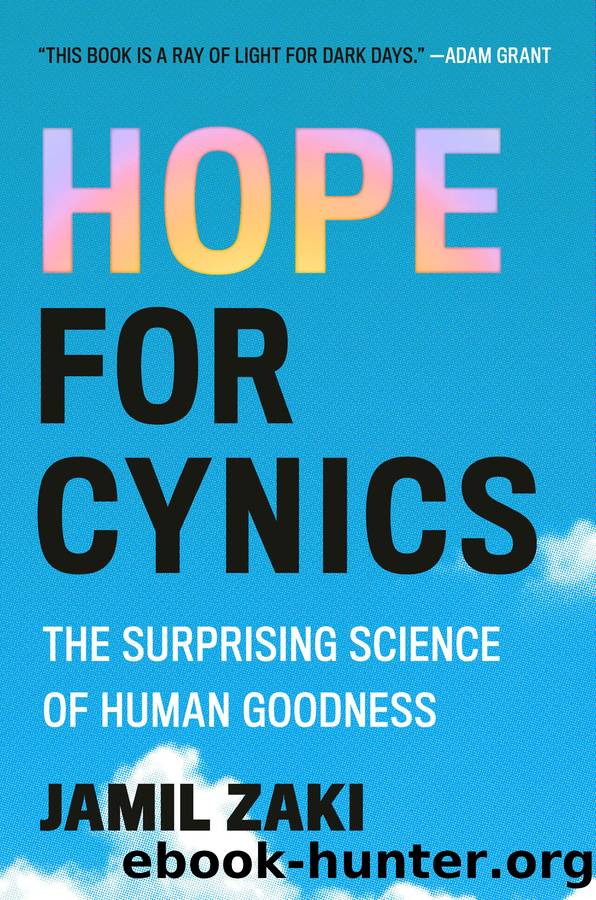Hope for Cynics by Jamil Zaki

Author:Jamil Zaki [ZAKI, JAMIL]
Language: eng
Format: epub, mobi
Publisher: Grand Central Publishing
Published: 2024-09-03T00:00:00+00:00
Disagreeing Better
As weâve seen, cynical people take preemptive strikes and bring out the worst in others. Hopeful individuals take leaps of faith and bring out othersâ best. Some of these are grand gestures. Kennedy and Khrushchevâs de-escalation was like Project RYaN in reverse: loud trust on a global stage.
Other leaps are small but still powerful, like spending time with people we disagree with. This sounds simple, but itâs started to feel impossible. As recently as 2016, 51 percent of Americans said it would be âinteresting and informativeâ to talk with a rival, edging out the 46 percent who said it would be âstressful and frustrating.â Five years later, this enthusiasm had evaporated: Fifty-nine percent said these conversations would be frustrating, and less than 40 percent said theyâd be interesting. Asked to compare talking with rivals to other activities, both Democrats and Republicans said theyâd prefer a painful dental procedure.
In a divided world, bringing people together is not like pulling teeth; itâs harder. Chatting with rivals feels dangerous and even immoralâlike the Romans inviting Visigoths for a beer during the siege. Even if they could get over their distaste, people donât see the point of cross-party conversations. In 2022, my lab asked hundreds of people what would happen if Republicans and Democrats talked politics. Most believed that people would agree with one another even less after the conversation. One Democrat from Pennsylvania wrote, âPolitical dialogue is doomed.â A Texas Republican said, âCivility is dead. Respectfully disagreeing is dead.â
They were both wrong. In the summer of 2022, my lab invited over a hundred Americans to set aside their trepidation and join twenty-minute Zoom calls with a rival. After logging on, tidying the rooms behind them, and remembering to unmute, the pairs talked about issues like gun control, climate change, and abortion. Our team had ensured that each person truly disagreed with their partner. We also set up contingency plans for what to do if people insulted or threatened each other.
To everyoneâs surprise, these conversations were wonderful. People clashed, but also listened. When we asked them to rate the experience on a scale from 1 (very negative) to 100 (very positive), the most common response was exactly 100. After talking with a rival, participantsâ dislike of rivals plummeted by more than twenty points on a hundred-point scale and remained lower three months later. If the rest of the country joined them, the clock on our nationâs partisan aggression would roll backward to the Clinton era: not an entirely peaceful time, but not nearly as vicious as our politics are today. People also left these chats less likely to dehumanize the other side, and humbler about their own opinions.
If social shark attacks scare us away from everyday interactions, they terrify us of rivals. And if conversations with strangers are surprisingly positive, meeting across difference is astonishingly useful. Emile believed this in his bones; one of the last experiments he ever published examined conversations between rivals. He acted on this faith personally as well. Nour Kteily, one of his collaborators, watched Emile interact with conservative friends on Facebook.
Download
This site does not store any files on its server. We only index and link to content provided by other sites. Please contact the content providers to delete copyright contents if any and email us, we'll remove relevant links or contents immediately.
The remains of the day by Kazuo Ishiguro(8999)
Tools of Titans by Timothy Ferriss(8396)
Giovanni's Room by James Baldwin(7346)
The Black Swan by Nassim Nicholas Taleb(7129)
Inner Engineering: A Yogi's Guide to Joy by Sadhguru(6794)
The Way of Zen by Alan W. Watts(6614)
The Power of Now: A Guide to Spiritual Enlightenment by Eckhart Tolle(5781)
Asking the Right Questions: A Guide to Critical Thinking by M. Neil Browne & Stuart M. Keeley(5775)
The Six Wives Of Henry VIII (WOMEN IN HISTORY) by Fraser Antonia(5515)
Astrophysics for People in a Hurry by Neil DeGrasse Tyson(5190)
Housekeeping by Marilynne Robinson(4447)
12 Rules for Life by Jordan B. Peterson(4304)
Ikigai by Héctor García & Francesc Miralles(4274)
Double Down (Diary of a Wimpy Kid Book 11) by Jeff Kinney(4272)
The Ethical Slut by Janet W. Hardy(4253)
Skin in the Game by Nassim Nicholas Taleb(4248)
The Art of Happiness by The Dalai Lama(4130)
Skin in the Game: Hidden Asymmetries in Daily Life by Nassim Nicholas Taleb(4006)
Walking by Henry David Thoreau(3962)
